MEMORIES AND INFORMATION - STAFFORDSHIRE HOME GUARD
71st WARKS (B'HAM) HOME GUARD
H.A.A. BATTERY ("F" Troop)
and
L/Cpl. ALEXANDER J. SCHADOWSKY
(Alexander J. Sinclair)
This is a page within the www.staffshomeguard.co.uk website. To see full contents, go to SITE MAP.
|
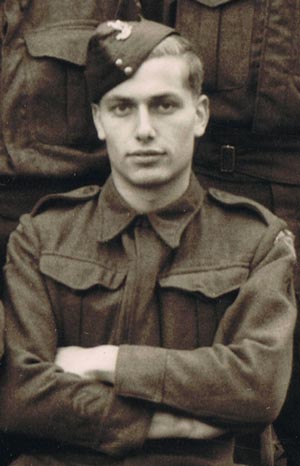 Alexander Schadowsky
was a young member of the 71st Warwickshire Home Guard Heavy Anti-Aircraft Battery, “F” Troop.
Alexander Schadowsky
was a young member of the 71st Warwickshire Home Guard Heavy Anti-Aircraft Battery, “F” Troop.
Alexander was a refugee from Nazi Germany. He was the son of a Latvian Jew and a German Christian mother and lived in Penig in Sachsen (Saxony). The family converted to Christianity but still had to flee from Eastern Germany in July 1939 in order to escape
the persecution of which the father had already been a
victiom. Alexander was 13 years of age at the time. He, his parents and his sister sought sanctuary in England, initially in London and then later
in Devon. Finally they settled in Kings Heath, Birmingham in November/December 1940.
The date of Alexander’s entry into Home Guard service
and the period of his service are confirmed by his King
George Certificate which survives in his family and is
displayed further down this page. It tells us that he joined
in December 1942 and served until the time of stand-down in
December 1944. He was 17 at the time of joining.
Alexander would have been unusual in being a
young man with a strong German connection and background
serving in a military unit being trained to defend against
a German attack. As his eldest son informs us, the story
of Alexander's nationality was however a complex one.
| Because he was
born in Germany and had a German mother, Alexander
might have been expected to hold automatic German
citizenship. But in fact this was not the case:
his nationality was based on that of his father,
which was Latvian. On arrival in England in
July 1939 a friendly immigration official advised
the family against registering as Latvian
nationals which would have been the correct course
of action - the future of an independent Latvia
even at that time being under threat from Soviet
Russia and perhaps Germany. Alexander's father
suggested that they should be registered as
stateless. But the advice offered was to register
as Russian and that was the choice made by
Alexander's father which determined the family's
nationality throughout the war and beyond, until
their naturalisation in 1947. Whether this
led to any discomfort after August 1939 - when
Stalin allied himself to Nazi Germany in its
aggression towards Eastern Europe and Russia was
hardly England's ally - we do not know. But after
June 1941 when Hitler turned on Soviet Russia,
Russian nationality would have been a badge of
honour and so all would have been well. |
A group photograph of
Alexander's section survives
(below)
with him seated extreme right on the front row.
The location of the battery in which he served has not yet been identified but all the indications are is that it was situated in the King’s Heath area. There are recollections of the existence of A.A. guns on
Billesley Common and possibly at
Swanshurst, both in the vicinity, but whether either of these is where Alexander and his comrades served, is so far unknown.

A larger group photograph also survives, of unknown date although it probably coincided with one of the anniversaries of the Home Guard's founding in May 1940. A visitor to this website identifies the location as
The Maypole, a pub subsequently demolished
(although still standing in the 1950s - see right). Alexander Schadowsky is in the third row from the back, 6th from the right.
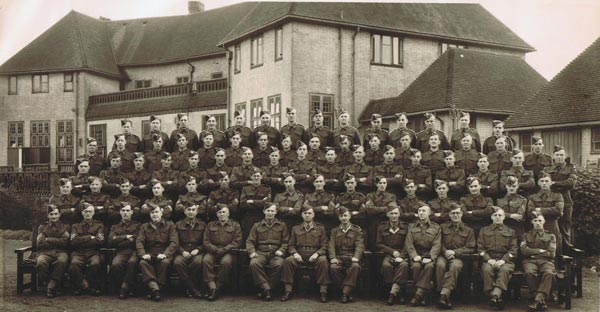
(Click on the image to see a magnified version)
Alexander clearly served through until the Home Guard was "stood down" in December 1944 and by that time had received the stripe of a lance corporal. He and his comrades enjoyed a Stand Down dinner and concert on Saturday 10th February 1945 and the programme survives, with many signatures including his own. The programme shows that this event took place at
Brandwood House Barracks, King’s Heath.

Menu75.jpg)
In addition to Alexander himself, two of the men who appear in the programme can be identified. Captain George H. Powell, who commanded the Battery, had in 1941 been a second lieutenant in the
30th Warwickshire (Birmingham) Battalion whence he later transferred to anti-aircraft battery duties as did so many Home Guards at the time with varying degrees of enthusiasm.
Colonel R. E. Cole had been a Birmingham Area Commander for all of the Home Guard’s 4½ year existence.
Whilst it is at present unconfirmed
and there may well indeed be significant doubt, these images may show
Brandwood House at the time.

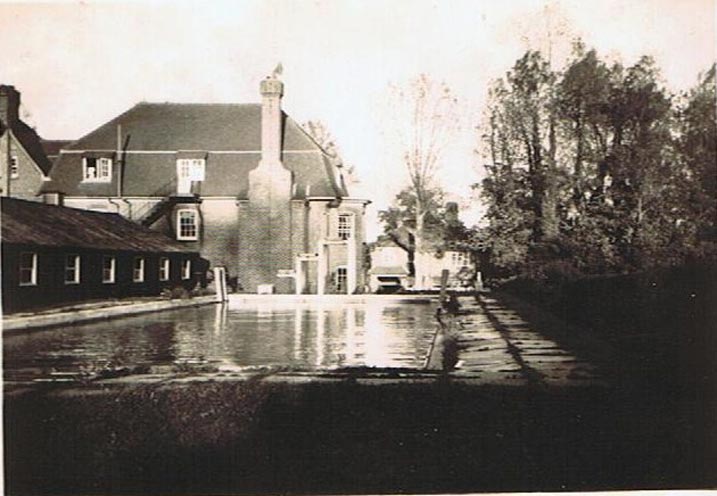
Alexander received several
official acknowledgements of his devoted service.
First was his King's certificate, thanking him for his
service in the Home Guard as a whole.
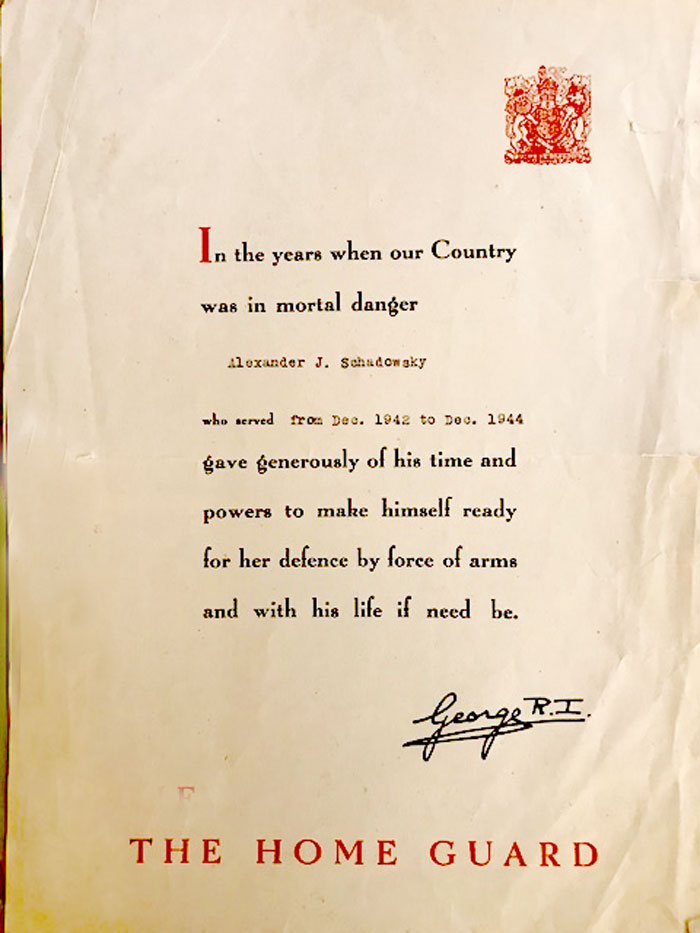
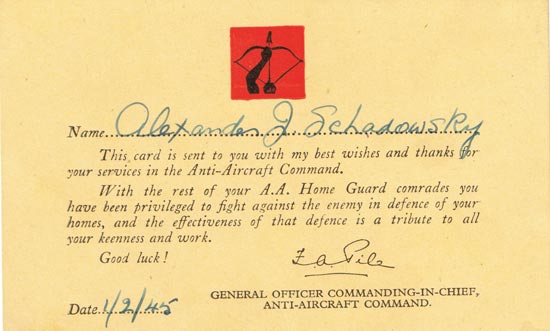
And, more specifically, Alexander received acknowledgement of his
anti-aircraft battery service from the
General Officer Commanding-in-Chief, Anti-Aircraft Command dated February 1st 1945
(left).
He was also in receipt of a
Defence Medal, the transmission document for which survives
(below).
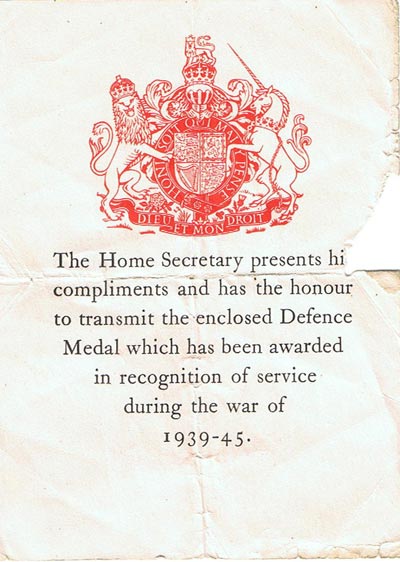
Amongst several other categories of people who had served the war effort, Home Guards were eligible for this latter award, normally on the basis that they had served for a minimum of three years.
As Alexander's service was in fact two years, we
may assume that the award was also made to those who, on the
basis of age, had rendered the maximum period of service
possible to them. His initial service may have been in one
of the original Birmingham battalions performing a more
traditional Home Guard role before transferring to
anti-aircraft duties.
Alexander became a British citizen in 1947 and at that point he and the rest of the family changed their name to 'Sinclair'. In later life he married and had 3 children. He went to Birmingham University where he obtained two degrees and then entered the teaching profession, eventually becoming a Secondary School Headmaster at schools in
Worcester,
Heidelberg (in the 1970s) and
Reading. He was also a Christian lay-preacher. He spoke word-perfect English and had no German accent whatsoever.
Alexander Schadowsky, later Sinclair, died in
Reading in 1986, aged 60 and is buried with his wife. His mother, father and sister lie in Brandwood Cemetery, Kings Heath.
Addendum:
A further member of this unit has been identified. He was L/Cpl. Buffery. Regrettably L/Cpl. Buffery does not appear in any of the above images but he served on a gun battery in
Crabmill Lane, not far from The Maypole. This may well have been the battery in which Alexander Schadowsky himself served.
************
| Let this page stand as a modest tribute to a remarkable man, rejected by
the country of his birth when the latter was under the thrall of a brutal and evil regime and then eager to give service with bravery and devotion to the nation which had given him refuge. |
************
ACKNOWLEDGEMENT
We are much indebted to Mrs. Elizabeth Aldridge of Devonshire for all the above information about her father, Alexander Schadowsky, and for her generous permission for its publication within this website;
to her brother, Julian Sinclair, for additional
information about the family's nationality; and to Barry
Buffery.
Images © Elizabeth Aldridge 2010
(except "The Maypole" - © Barry Buffery 2010)